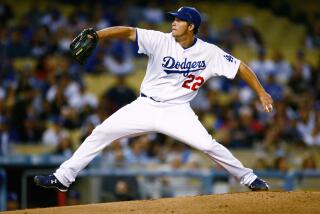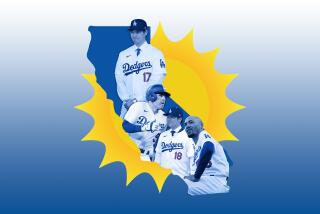DICK SCHOFIELD : He Stands Quite Tall at Short
- Share via
MESA, Ariz. — The kid with the .206 lifetime batting average and the father named Ducky was at it again. The batter’s box was vacant but Dicky Schofield was still in the on-deck circle, straining and struggling to remove the weighted doughnut from his bat.
Normally, this is not the most strenuous of procedures, but there was Schofield, pounding away while his teammates laughed and the umpire tapped his foot. The doughnut wouldn’t budge.
Finally, Schofield tossed the bat aside and retreated to the dugout for another. Just then, Reggie Jackson, basher of 500 home runs, interceded. Here’s how it’s done, son. With one firm whack of the bat against the ground, Jackson solved the problem.
Red-faced, Schofield picked up the bat and dragged it with him to home plate. So much for great beginnings. As entrances go, this was strictly wimp city.
His exit went a little smoother. Schofield swung at the second pitch he saw from Oakland A’s pitcher Rick Langford. The ball landed beyond the left-field fence. Home run . . . and the Angels were on their way to a 5-1 victory last April.
If you need an idea of what the 1986 season meant to the baseball career of Dick Schofield, that one at-bat serves nicely as a representative moment. Last year was Schofield’s year of transition--from flyweight to postseason hitting star, from automatic out to home run hero, from shortstop in jeopardy to winner in arbitration.
The last time the Angels convened in Mesa for spring training, Schofield was a two-year starting shortstop not completely certain of extending that streak to three. He had batted .193 and .219 in his first two big-league seasons. He was being pressed by another young shortstop, Gus Polidor, who went on to bat .350 in spring games. And he played for a manager, Gene Mauch, who frankly wondered how much longer he could afford to carry a .200-hitting shortstop in his lineup.
“They kind of worded it that way to me,” Schofield said. “You better hit or else.”
So, Schofield hit.
He raised his batting average 30 points to a final 1986 mark of .249. He hit 13 home runs, up from 8 in 1985, and drove in 57 runs, up from 41. For comparison’s sake, Jackson finished 1986 with 18 home runs and 58 RBIs.
Schofield hit the grand slam that climaxed the Angels’ most spectacular comeback, from a 12-5 ninth-inning deficit that wound up a 13-12 Angel victory. He hit the single that broke up Danny Jackson’s no-hitter, also in the ninth inning. He hit the home run that beat Dennis (Oil Can) Boyd in Game 3 of the American League playoffs and wound up with a postseason batting average of .300.
At season’s end, Schofield was eligible for salary arbitration and found himself with statistics worthy of throwing onto the negotiating table. Schofield asked for $475,000. The Angels countered with $305,000.
Schofield won, earning a contract that ranks him among the top-echelon shortstops in the American League.
“So does his play,” Mauch said. “His play got there before the contract numbers did.”
Defensively, his play has always been superior. For almost no other reason than his glove work, Schofield was able to hold down a regular spot in the Angel lineup during 1984 and ’85.
Mauch remembers the first time he saw Schofield, the Angels’ No. 1 selection in the 1981 draft. The son of former major league infielder Dick (Ducky) Schofield was a natural when it came to gobbling up grounders and throwing to first base.
“People wouldn’t understand this, but he has what I call pretty feet,” Mauch said. “Happy feet. And that leads to great balance and range. That was the first thing that stood out.”
But even Mauch does not live by defense alone. Patiently, he had waited for Schofield’s bat to catch up with his glove. By the spring of 1986, Mauch’s patience was starting to ebb.
Schofield’s problem, as Mauch saw it, was a stubborn streak. Schofield was like a nickel-and-dime gambler who once struck it rich and then couldn’t stay away from the tables until he was broke. “He hits one home run and tries to do it all the time,” Mauch once lamented. “He’d rather hit one home run than 10 singles.”
Schofield admits to an early addiction to pull hitting.
“I just knew one way of hitting--go up there and hack,” he said. “I was successful at it until ’84. I spent a whole year of doing pretty much of nothing in ’84. I started to realize, you really can’t do it that way.”
“He was a free swinger,” said Angel hitting coach Moose Stubing, who managed Schofield in Edmonton in 1983. “In the lower classes (of the minor leagues), he could get away with it. It’s taken a while to get him to put the ball in the right-center and left-center field alleys.”
“Last year, I moved the ball around the entire field more,” Schofield said. “I had to start thinking that way.”
So Schofield survived, blunting the challenge of Polidor in the spring and Rick Burleson, who batted .284, in the summer. He also thrived. Several Angels tab Schofield’s game-winning grand slam against the Detroit Tigers last Aug. 29 as the event that triggered the team’s eventual runaway in the American League West.
The ’86 Angels were hardly a rally-round-the-flag bunch--they were old and they acted their age--but Schofield’s home run, on an 0-and-2 pitch off Willie Hernandez, actually managed to stir some emotions in the Angel clubhouse.
“There were high fives, people hugging each other,” Schofield recalled. “It was a great feeling. That home run will stick in my mind forever. When I visualize it now, it still sends chills through my body.
“We had been doing it, coming back, all year. We won a lot of games from the fifth inning on. But after that one, there was a different feeling. The next night, Doug DeCinces hit a game-winning home run in the bottom of the ninth. I think it helped us the rest of the way.”
The rest of the way led to the AL playoffs.
“I kind of showed a few people there that maybe I can play a little bit,” Schofield said.
Now, the hope for 1987 is that maybe Schofield will talk a little bit. At 24, beginning his fourth season with the Angels, Schofield is still perceived as the shortstop in a shell, a perception that wasn’t helped by his behavior after his playoff home run.
Schofield’s home run off Boyd had broken a 1-1 tie, leading to a 5-3 Angel victory and a 2-1 Angel advantage in the series. America’s press sought out Schofield.
But he refused the Angels’ request to appear in the postgame interview room and arranged for a hasty exit by having a clubhouse attendant bring his clothes into the shower stalls so he could dress and leave through a back door.
“I just didn’t want to talk,” Schofield said when asked of the media snub. “If we had just won the seventh game of the World Series, I’d have talked all day if you wanted. We still had to win two more games. No sense talking about it until it’s over.”
Schofield says he isn’t shy. And during the early days of this camp, he can be seen daily, shagging balls in the outfield while swapping jokes with Rob Wilfong and keeping Wally Joyner in stitches.
“If I like somebody, if it’s somebody I want to hang out with, I’ll talk their ear off,” Schofield said. “But, really, there are some people I don’t want to talk to. I don’t mean to be rude, but sometimes people I’ve never met come up to you and ask you things that are none of their business.”
Stubing said he has noticed a change in Schofield’s social skills.
“He may not hold a hell of a conversation with you guys (reporters), but in the last two years, little by little, he’s opening up more and more,” Stubing said.
But what about the tradition of shortstop--that the position is best held by vocal, take-charge and take-no-guff types.
“That used to be the tradition,” Mauch admits. “But that’s not in (Schofield’s) makeup. Why dare ask somebody to do something that doesn’t fit their personality? There have been a lot of great ballplayers who didn’t have a lot to say.”
Stubing said: “We had a lot of strong personalities on the team last year. With Reggie and Burleson, how in the hell is a young shortstop going to be a leader?
“But Dick might have more to say this year, now that he’s breaking in a new second baseman in (Mark) McLemore.”
Remember that Schofield, despite his playing experience, is still a kid, Stubing said. “What is Dicky now? All of 24?”
And so, the greening of a shortstop continues.
“He played better last year, but that’s the normal amount of improvement you expect from a very talented player,” Mauch said. “It will continue. On a gradual basis, he will develop into a great player.”
Stubing sees Schofield batting .285 some day. Mauch sees him stealing 30 bases and hitting 25 home runs in a season.
“He’ll hit 25 some day,” Mauch assures. “I don’t know when it will happen. It may not happen for three more years. Dick will be 27 by then. And won’t that be a shame.”
Angel Notes
Relief pitcher Stewart Cliburn came to terms with the Angels Monday, leaving the club’s number of unsigned players at nine.
More to Read
Go beyond the scoreboard
Get the latest on L.A.'s teams in the daily Sports Report newsletter.
You may occasionally receive promotional content from the Los Angeles Times.






